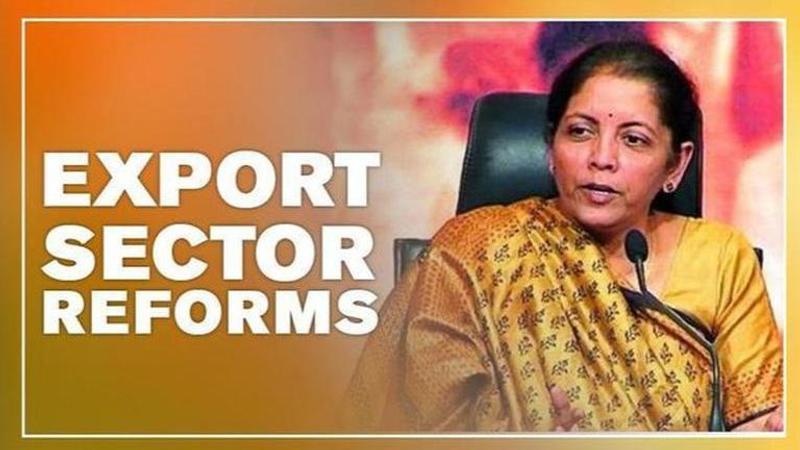Published 17:03 IST, September 14th 2019
Finance Minister Nirmala Sitharaman unveils reforms to boost exports
On Saturday, Union Finance Minister Nirmala Sitharaman has unveiled another set of reforms to boost export sector, including leveraging technology and so forth

On Saturday, Union Finance Minister Nirmala Sitharaman unveiled another set of reforms to boost the export sector. In the last few weeks, the government has introduced a slew of measures in various areas like Foreign Direct Investment (FDI), bank mergers and governance reforms, automobile industry, tax and so forth to help the country achieve the target of $5 trillion economy. This comes at a juncture when there is a slowdown in the growth as well as consumption in India. Here is how the exporters stand to gain:
Scheme extension
The scheme for Remission of Duties or Taxes on Export Production (RoDTEP) will replace the Merchandise Exports from India (MIES) scheme. The existing dispensation would continue till December 31, 2019. All sectors including Textiles that currently enjoy up to 2% over MIES will transit into RoDTEP from January 1, 2020. With the revenue forgone projected at Rs. 50,000 crore, RoDTEP is set to benefit exporters more than all existing schemes put together.
Automated electronic refund and revised PSL norms
By the end of September 2019, fully electronic refund module will be initiated for Input Tax Credits (ITC) in Goods and Services Tax (GST). This is expected to monitor and speed up the ITC refunds as it is an automated process. Also, the Priority Sector Lending (PSL) norms for export credit have been examined. Thus, Rs. 36,000 crore in addition to Rs. 68,000 crore will be released as export credit under the priority sector.
Scope of Export insurance enhanced
The Export Credit Guarantee Corporation (ECGC) will expand the scope of the Export Credit Insurance Scheme (ECIS). The banks that lend working capital to exporters will receive a higher insurance cover. This measure will cost about Rs. 1,700 crore per year. The premium incidence for the micro, small and medium enterprises (MSMEs) is going to be moderated according to the requirement. This helps reduce the total cost of export credit including interest rates to MSMEs.
Export Finance monitoring and use of Technology
An Inter-Ministerial Working Group in the Department of Commerce will regularly monitor the Export Finance. It will be tracked via a dashboard after which necessary actions can be taken after reviewing the data with the institutions. An Inter-Ministerial Group will be responsible for reducing the time of exports. The action plan in this regard will be implemented by December 2019. Real-time data of turnaround times will be published for each port and airport. Technology would be leveraged to the maximum possible extent to digitise export clearances and eliminate offline manual services.
Mega shopping festivals and E-commerce
Mega shopping festivals will be organised in four places across March 2020. They will focus on sectors like handicraft, yoga, tourism, textiles, and leather. Efforts will be undertaken to ensure mass enrolment of artisans across India. Handicraft artisans and co-operatives will be on-boarded directly on E-commerce portals to enable seamless exports.
FTA Utilisation Mission
Free Trade Agreement (FTA) Utilisation Mission, headed by a senior officer in the Department of Commerce, will be set up. It aims to utilise concessionary tariffs in each FTA. It will also spread awareness of preferential duty benefits among MSMEs under FTAs for exporters. Moreover, the Directorate General of Foreign Trade along with Exports Inspection Council will launch an original ‘Online Management System’ for the exporters. This would enable them to obtain Certificates of Origin, thereby improving the ease of business.
Adoption of mandatory technical standards
A Working Group on Standards in the Department of Commerce will engage with the industry to adopt technical standards within a timeframe. Thus, Indian products will be able to overcome non-tariff barriers in exports. Furthermore, the testing and certification infrastructure will be made more affordable to reduce costs of the Indian exporters.
Updated 19:28 IST, September 14th 2019




